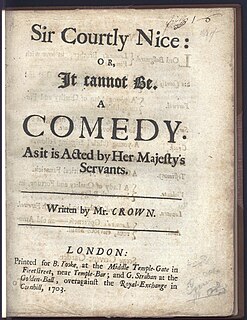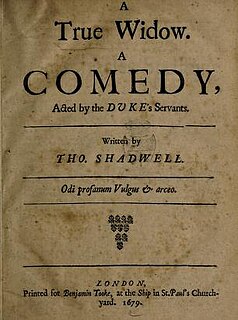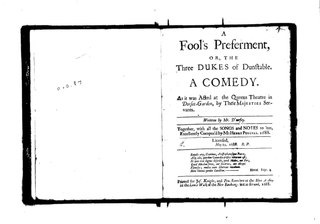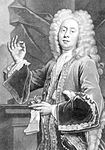
The Squire of Alsatia is a 1688 comedy play by the English writer Thomas Shadwell. Alsatia was a nickname for the Whitefriars area of London, deriving from Alsace in northeastern France. A restoration comedy, it was performed at the Drury Lane Theatre by the United Company following on from John Crowne's Darius, King of Persia. One of the best-remembered roles, that of the shrewish Mrs. Termagant was first performed by Elizabeth Boutell. It was revived numerous times during the eighteenth century.
The Sullen Lovers; Or, The Impertinents is a 1668 comedy play by the English writer Thomas Shadwell, inspired by Molière's Les Fâcheux. It was staged by the Duke's Company at the Lincoln's Inn Fields Theatre in London. The cast included Henry Harris as Sir Positive At-All, James Nokes as Poet Ninny, William Smith as Standford and Edward Angel as Woodcock and Anne Shadwell as Emelia.

Epsom Wells is a 1672 restoration comedy by the English writer Thomas Shadwell. It was the first in a line of plays set in spa towns. The incidental music was composed by Nicholas Staggins. In the 1690s Henry Purcell scored a new staging of the play. It was performed at the Dorset Garden Theatre by the Duke's Company. The cast included Henry Harris as Rains, Thomas Betterton as Bevil, William Smith as Woodly, Cave Underhill as Justice Clodpate, Anne Gibbs as Lucia, Mary Betterton as Mrs Jilt, James Nokes as Bisket and Edward Angel as Fribble.

Greenwich Park is a 1691 comedy play by the English writer William Mountfort.

Sir Courtly Nice: Or, It Cannot Be is a 1685 comedy play by the English writer John Crowne. Rehearsals by the United Company were underway when the death of Charles II in February led to the closure of all theatres as a mark of respect. The play was eventually staged on 9 May at the Theatre Royal, Drury Lane. It is the tradition of the Restoration Comedy. A popular hit it became a stock part of the repertoire for more than a century, with Colley Cibber and Anne Oldfield appearing in a celebrated 1709 revival.

Dame Dobson is a 1683 comedy play by the English writer Edward Ravenscroft.
The Counterfeits is a 1678 comedy play by the English writer John Leanerd. It was staged by the Duke's Company at the Dorset Garden Theatre with a cast that included Anthony Leigh as Don Gomez, Thomas Gillow as Don Luis, Thomas Betterton as Vitelli, Henry Harris as Antonio, Matthew Medbourne as Carles, William Smith as Peralta, Thomas Percival as Dormilon, Cave Underhill as Fabio, Joseph Williams as Crispin, John Richards as Tonto, Mary Lee as Elvira, Emily Price as Violante and Anne Shadwell as Flora.

The Counterfeit Bridegroom; Or, The Defeated Widow is a 1677 comedy play. The work's authorship is usually credited to Aphra Behn has been alternatively been attributed to Thomas Betterton. It was inspired by Thomas Middleton's Jacobean play No Wit, No Help Like a Woman's.
The Wrangling Lovers; Or, The Invisible Mistress is a 1676 comedy play by the English writer Edward Ravenscroft.
Sir Anthony Love; Or, The Rambling Lady is a 1690 comedy play by the Irish writer Thomas Southerne. It was originally staged by the United Company at the Theatre Royal, Drury Lane with a cast that included Susanna Mountfort in a breeches role as Sir Anthony Love, William Mountfort as Valentine, Joseph Williams as Ilford, William Bowen as Sir Gentle Golding, Anthony Leigh as An Abbe, John Hodgson as Count Canaile, Samuel Sandford as Count Verole, George Bright as Waitwell, Colley Cibber as Servant to Sir Gentle, Charlotte Butler as Floriante, Anne Bracegirdle as Charlote and Frances Maria Knight as Volante. The play's incidental music was composed by Henry Purcell.
Love For Money; Or, The Boarding School is a 1691 comedy play by the English writer Thomas D'Urfey. It was originally staged at the Theatre Royal, Drury Lane by the United Company. In 1733 it was adapted into a ballad opera The Boarding School by Charles Coffey.

The Wives Excuse also The Wives Excuse; Or, Cuckolds Make Themselves is a 1691 comedy play by the Anglo-Irish writer Thomas Southerne. The title is sometimes written more grammatically as The Wives' Excuse.
Friendship in Fashion is a 1678 comedy play by the English writer Thomas Otway. It was first staged by the Duke's Company at the Dorset Garden Theatre in London. It was part of the trend of Restoration Comedy that flourished during the era.

She Would If She Could is a 1668 comedy play by the English writer George Etherege. It was originally staged at the Lincoln's Inn Fields Theatre by the Duke's Company.
The Woman Captain; Or, The Usurer Turned Soldier is a 1679 comedy by the English writer Thomas Shadwell. It was originally staged by the Duke's Company at Dorset Garden Theatre in London. The original cast is unknown except for Elizabeth Barry who played the title role, and also read the epilogue. It is part of the tradition of Restoration Comedy that flourished during the era.

A True Widow is a 1678 comedy play by the English writer Thomas Shadwell. It was first staged by the Duke's Company at the Dorset Garden Theatre in London. The names of the original cast are unknown. The prologue was written by Shadwell's colleague John Dryden. It was published the following year and dedicated to Charles Sedley.

The Fortune Hunters; Or, Two Fools Well Met is 1689 comedy play by James Carlile. It was originally staged by the United Company at the Theatre Royal, Drury Lane in London.

Madam Fickle; Or, The Witty False One is a 1676 comedy play by the English writer Thomas D'Urfey. It was first staged at the Dorset Garden Theatre by the Duke's Company.

A Fool's Preferment; Or, The Three Dukes Of Dunstable is a 1688 comedy play by the English writer Thomas D'Urfey. It is a reworking of John Fletcher's Jacobean work The Noble Gentleman. It was first performed by the United Company at the Dorset Garden Theatre in London. Henry Purcell composed the play's incidental music. It was his first major work composingfor the theatre in seven years since Sir Barnaby Whigg.

Tom Essence; Or, The Modish Wife is a 1676 comedy play by Thomas Rawlins, sometimes also attributed to Edward Ravenscroft. It was first performed at the Dorset Garden Theatre in London by the Duke's Company. Along with Thomas Otway's The Soldier's Fortune it incorporated scenes from Moliere's The Imaginary Cuckold in an otherwise unrelated plot.














